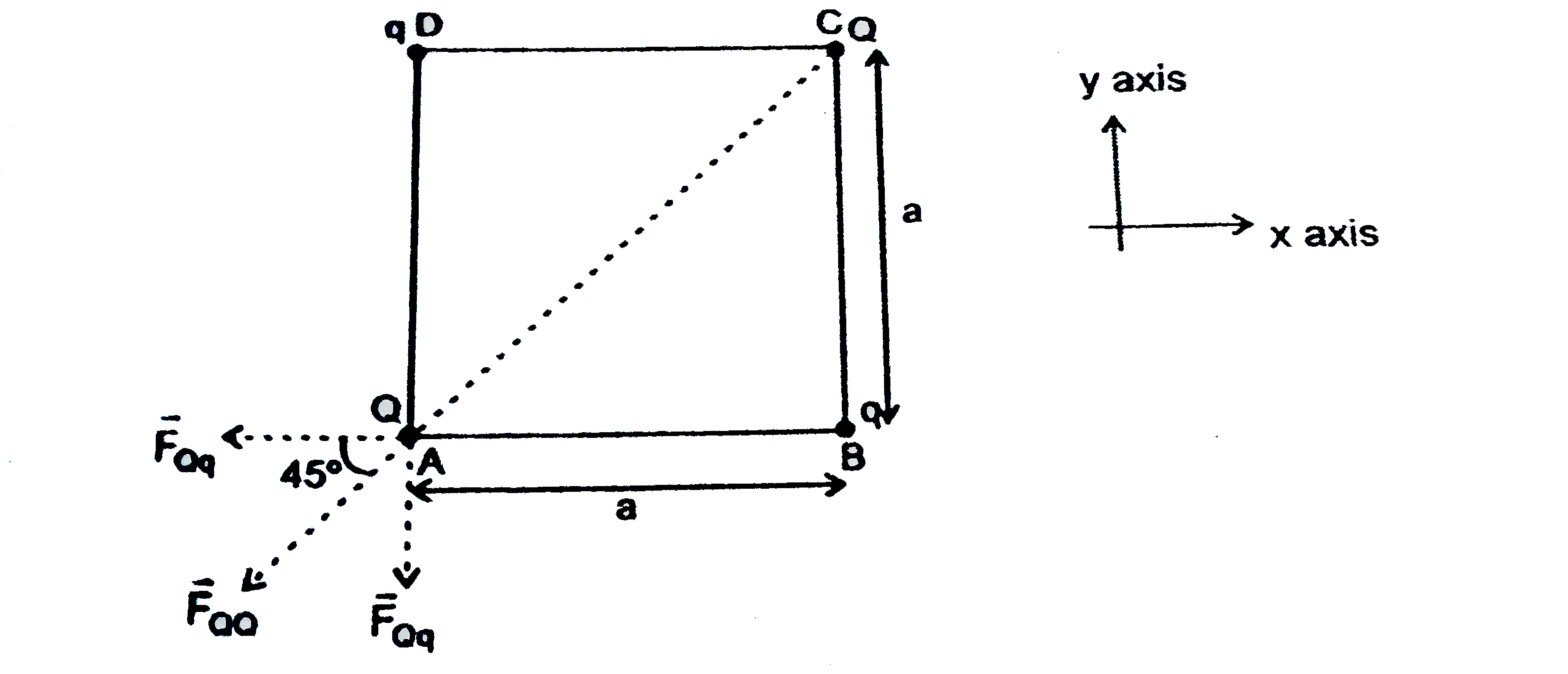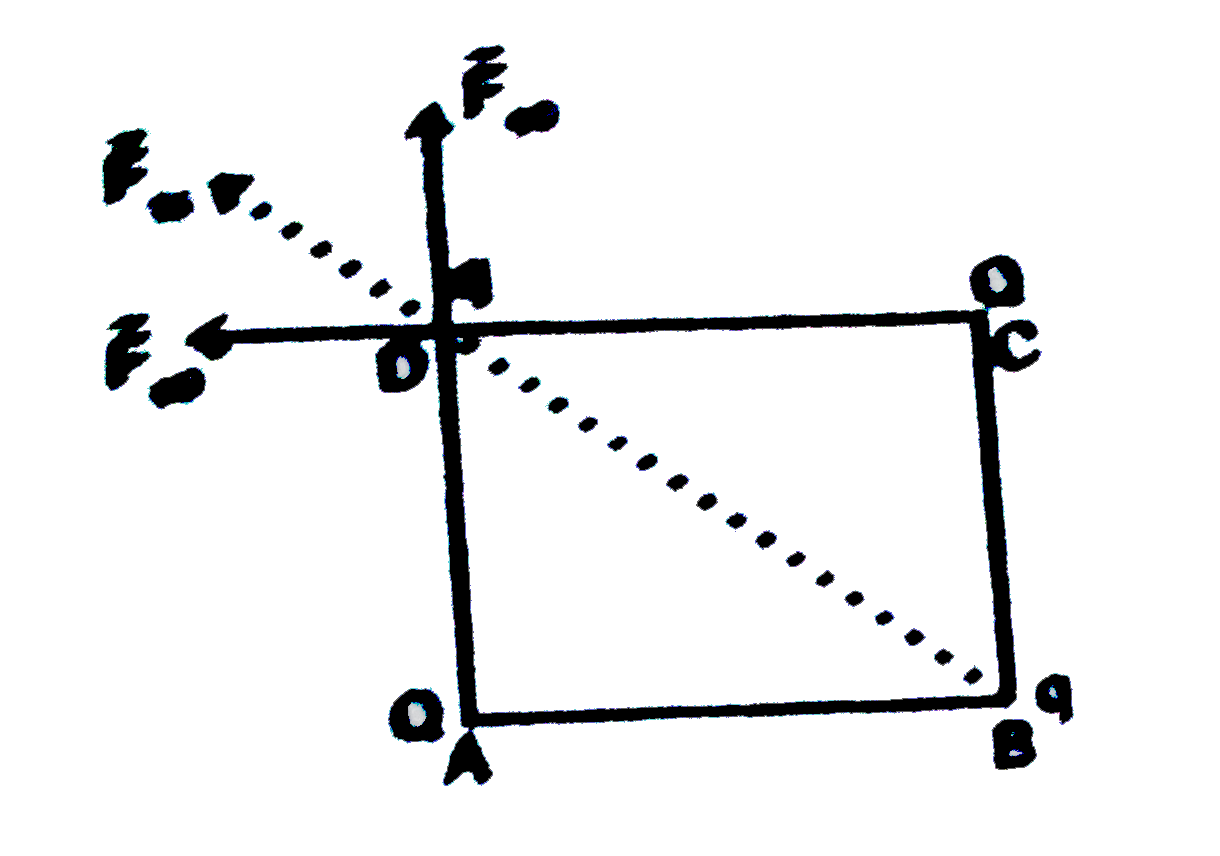A charges Q is placed at each of the two opposite corners of a square. A charge q is placed to each of the other two corners. If the resultant force on each charge q is zero, then
(a) Let on a square ABCD, charges are placed as shown

Now, forces on charge Q (at point A) due to other charge are →FQQ,→DQq and →FQq respectively as shown in figure.
Fnet on Q=→FQ.Q+→FQq+→FQq (at point A)
But Fnet=0
So, ΣFx=0
ΣFx=−FQQcos45∘−FQq
⇒KQ2(√2a)2.1√2+KQqa2=0⇒ q=−Q2√2
(b) For resultant force on each charge o be zero :
From previous data, force on charge Q is zero when q=−Q2√2 If for this value of charge q, force on q is zero, then and only then the value of q exists for which the resultant force on each charge is zero.
Force on q :
Forces on charge q (at point D) due to other three charges are →FqQ,→Fqq and →FqQ respectively as shown in figure.
Net force on charge q :
−→net=→Fqq+→FqQ+→FqQ But →Fnet=0
So, ΣFx=0
ΣFx=−Kq2(√2a)2.1√2−KQq(a)2 ⇒ q=2√2−Q
But from previous condition, q=−Q2√2
So, no value of q makes the resultant force on each charge zero.

Topper's Solved these Questions
- BOOK - RESONANCECHAPTER - ELECTROSTATICSEXERCISE - Exercise-1 Section (A)9videos
ELECTROSTATICS
- BOOK - RESONANCECHAPTER - ELECTROSTATICSEXERCISE - Exercise-1 Section (B)12videos
ELECTROSTATICS
- BOOK - RESONANCECHAPTER - ELECTROSTATICSEXERCISE - HLP39videos
ELECTROSTATICS
- BOOK - RESONANCECHAPTER - ELECTROMAGNETIC INDUCTIONEXERCISE - A.l.P19videos
ELECTROMAGNETIC INDUCTION
- BOOK - RESONANCECHAPTER - EXPERIMENTAL PHYSICSEXERCISE - PART -II10videos
EXPERIMENTAL PHYSICS
Similar Questions
A charge Q is placed at each of the two opposite corners of a square of side a.A charge is placed at each of the other two corners. (a) if the reultant electrical force system of charges? What is the signification of its negative potential energy?
View SolutionTwo equal point charges Q=+√2μC are placed at each of the two opposite corners of a square and equal point charges q at each of the other two corners. What must be the value of q so that the resultant force on Q is zero?
View Solution
Knowledge Check
- Question 1 - Select One
A charge Q is place at each of the opposite corners of a square. A charge q is placed at each of the other two corners. If the net electrical force on Q is zero, then Q/q equals:
A(a) −1B(b) 1C(c) −1√2D(d) −2√2 - Question 2 - Select One
A charge Q is placed at each of the opposite corners of square. A charge q is placed at each of the other two corners. If the net electrical force on Q is zero , then Q/q equals.
A−1B1C−1√2D−2√2 - Question 3 - Select One
Four positive charges (2√2−1)Q are arranged at the four corners of a square. Another charge q is placed at the center of the square. Resulting force acting on each corner charge is zero if q is
A−7Q4B−4Q7C−QD−(√2+1)Q
A point charge Q is placed at the corner of a square of side a. Find the flux through the square.
View SolutionTwo point charges +Q each are placed at adjacent corners of a square. Other two point charges -Q each are placed at the remaining two corners of the same square . The side of the square is l. Find electric field intensity at the centre of the square.
View SolutionFour identical charges, Q each, are fixed at the vertices of a square. A free charge q is placed at the centre of the square. Investigate the nature of equilibrium of charge q if it is to be displaced slightly along any of the two diagonals of the square.
View SolutionA charge +q is fixed to each of three corners of a square .On the empty corner a charge Q is placed such that there is no net electrostatic force acting on the diagonally opposite charge then
View SolutionFour identical charges i.e. q is placed at the corners of a square of side a. The charge Q that must be placed at the centre of the square such that the whole system of charges in equilibrium is
View Solution
